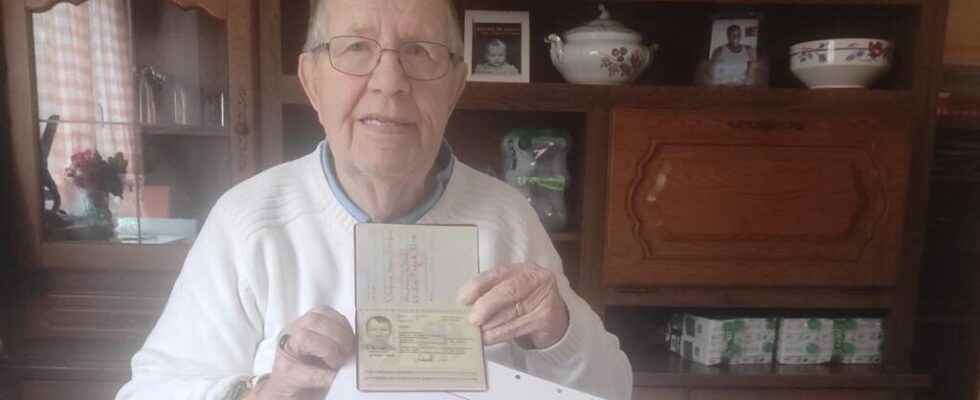Daniel Rouxel was born to a French mother and a German soldier father during the Second World War. In France, around 200,000 Franco-German children share his story. An often painful story.
Today, Daniel Rouxel is proud to be German. ” Look, “Bundesrepublik Deutschland, Einbürgerungsurkunde“. It’s okayut say: Rpublic federaled‘Germanycertificate of naturalization. Hanging next to the precious document, a small German flag and a photo of him, in front of the German Embassy in Paris.
The walls of his apartment in Le Mans, in the Sarthe, are full of press articles and photos. ” Here is, this is my german family he announces proudly, pointing to a collage of portraits. Daniel Rouxel’s father was from Unterweissach, not far from Stuttgart. His mother, French, came from a small village in the Côtes d’Armor, in Brittany. More than 1,000 kilometers separate the towns of Otto Daniel Ammon and Léa Rouxel. And yet, they met.
It was in 1942. Between 1940 and 1944, the German Reich then occupied France. During these four years, between 40,000 and 200,000 German soldiers were deployed in France.
One day, when she comes home from work, Daniel Rouxel’s mother, Léa, derails on her bicycle, right next to the German troop air base. Otto Daniel Ammon then drives by, stops and, since he speaks good French, engages in discussion. He invites her to come and work in the canteen of the German camp. This is how they get closer. ” They were in love smiles Daniel Rouxel. A few months later, in April 1943, he was born.
In his living room, several boxes with documents and photos pile up. ” That was my father and my mother. But his father will only see him once in his life. ” He kissed me “says Daniel Rouxel, too young at the time to remember. At the end of the war, in 1945, his father died. He succumbed to his injuries following a bombardment.
The day after the Liberation, his mother moved to Paris. She is considered a pariah, because going out with the occupier, the enemy, the “Boche”, responsible for many war crimes, is a shame. Until he was four years old, Daniel Rouxel lived with a foster family, then was sent, alone, to his grandmother’s house in Mégrit, in Brittany. ” She considered me a stranger. She forbade me to say “you”. You had to say “you”. She didn’t care about me », he remembers.
” We do not speak with the Boche! »
In his childhood, in the 1940s and 1950s, the war and the crimes committed by the German occupier were still very present. According to Mathias Delori, political scientist and historian attached to the Marc Bloch Center in Berlin, we can even speak of “ Germanophobia which was not only present in the masses, but also in the elites “. Children from Franco-German unions during the war – not always of love, moreover – were often called “ shadow children or, even worse, ” shame “.
For Daniel Rouxel’s grandmother, he was a ” boche son “. ” She locked me up almost every day in a chicken coop. It was a punishment, so people could see that the German was being punished. Chickens, pigeons and rats climbed on top of him. In revenge, he broke the eggs.
And at school too, blond with blue eyes, he was harassed because of his origin. In France at the time, that was enough to stir up hatred, especially when you didn’t have a father. ” I was ignored, the classmates as well as the teacher. Their motto: We do not speak with the Boche! ». ” It hurt me when they called me that. I was very unhappy. “To the point that he wanted to put an end to his life twice. ” It was grief. The French always told me stories about the Germans, with the aim of hurting me. And it made me cry. »
All his childhood he was ashamed of being a son of a German. At 16, he finally left his grandmother’s village. He became an industrial designer, then moved to Le Mans. The image of Germans in France began to change in the early 1960s, when Charles de Gaulle and German Chancellor Konrad Adenauer signed the Elysée treaty (whose 60th anniversary is being celebrated this year), considered the founding stone of Franco-German friendship. Subsequently, the exchanges between the young people of the two countries, the diplomatic gestures of reconciliation – for example, Charles de Gaulle’s speech to German youth in Ludwigsburg, the celebration of a common mass in Reims – multiply. Public opinion changes.
Like many Franco-Germans who share his story, he only started talking about it openly in the early 1990s. Today, when you arrive at his house, on his doorbell, just below his name, you find the association’s logo hearts without borders », of which he was one of the co-founders in 2005. On the occasion of the publication of the book Cursed Children*bringing together numerous testimonies, he was invited with other Franco-German children born during the war to the ” Deutsche Dienststelle in Berlin, the German Records Office. Following this meeting, they decide to unite in the search for their fathers. Since then, the Franco-German association has rediscovered a good hundred fathers “, according to the current president, Chantal Le Quentrec.
Daniel Rouxel is proud to be German today. ” Germany, I always had it in my heart. I feel Franco-German “, he claims, showing his two passports, that of the French Republic and that of the Bundesrepublik Deutschland.
► To listen: France – Germany: How the peoples were reconciled
► For further :
- ” children of the night », short film with Adèle Haenel, Caroline Deruas and Olivier Berlemen
- * Cursed Children, Jean-Paul Picaper and Ludwig Norz. 2004, Editions des Syrtes.
